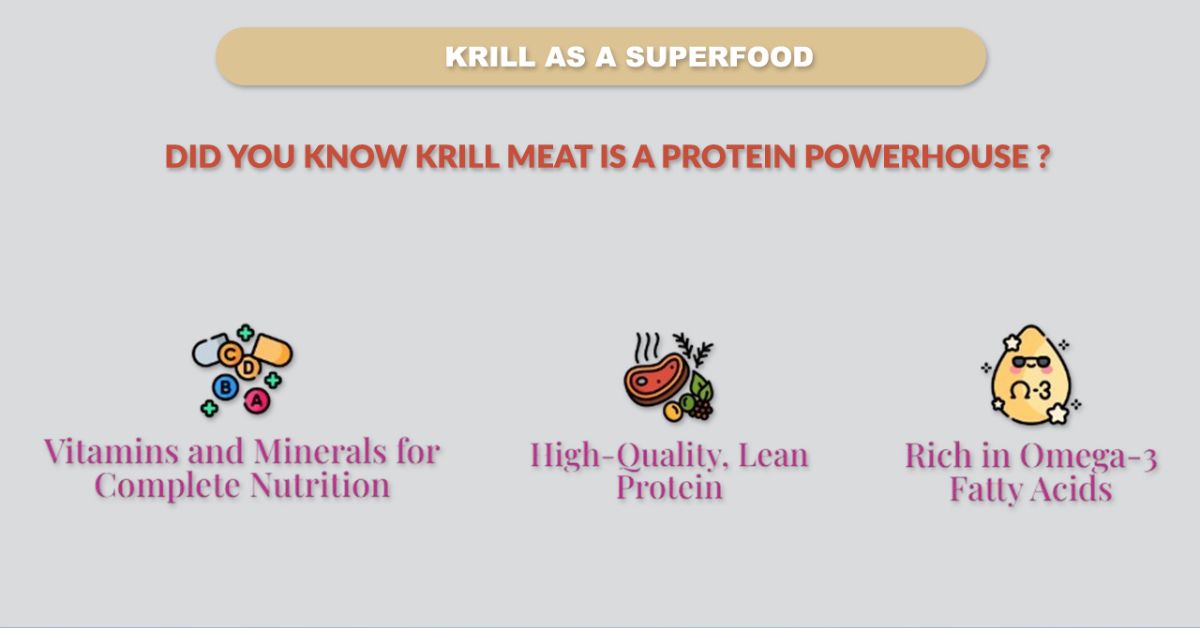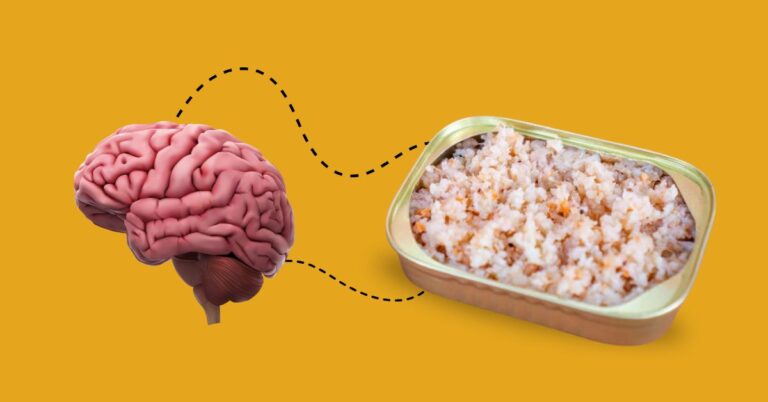Superfoods often bring to mind trendy berries, leafy greens, or nutrient-packed seeds, but one of the most powerful has been hiding in plain sight krill. Despite its impressive nutritional value, this tiny crustacean is often overlooked in favor of more familiar options like salmon or flaxseeds.
But here’s the truth krill is loaded with high-quality protein, omega-3 fatty acids, and astaxanthin, a powerful antioxidant with anti-inflammatory properties. These nutrients don’t just exist in krill; they work together in a highly absorbable form that supports heart health, brain function, joint mobility, and skin vitality.
So why hasn’t krill earned the same superfood status as acai berries or chia seeds? Many people simply don’t realize its potential. That’s why today, we’re breaking down its impressive health benefits and showing you why adding krill to your diet could be a game-changer. Let’s dive in.
What Makes Krill a Superfood? Nutrition Facts
Krill earns its superfood status not just because of the nutrients it contains, but because of how effectively the body can absorb and use them. From high-quality protein to powerful antioxidants, krill delivers a unique blend of health-supporting compounds that work together for maximum benefit. Here’s what sets it apart.
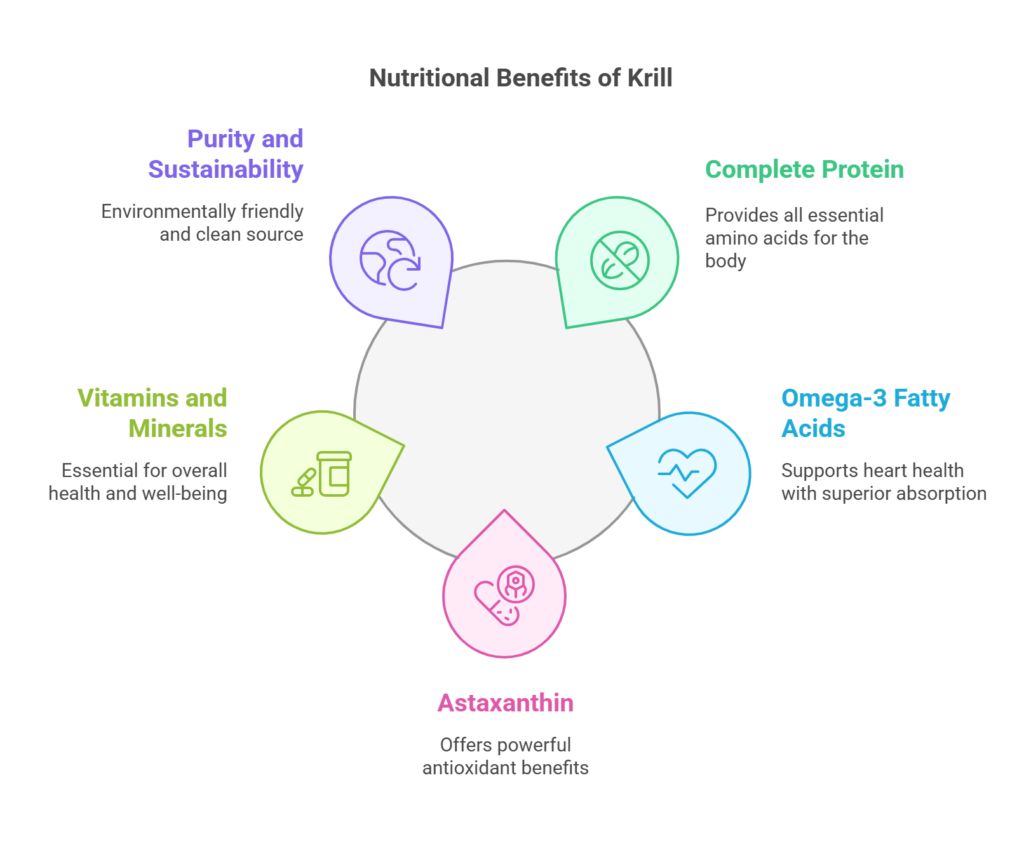
Complete, High-Quality Protein
Krill provides a complete source of protein, delivering all nine essential amino acids the body needs but can’t produce on its own. These amino acids are critical for muscle repair, hormone production, and enzyme function. Unlike many plant-based proteins, krill offers a balanced amino acid profile, making it an ideal choice for supporting strength, recovery, and overall cellular health.
Omega-3 Fatty Acids with Superior Absorption
Krill is packed with omega-3 fatty acids, specifically EPA and DHA, which play a key role in heart health, brain function, and inflammation control. What makes krill’s omega-3s stand out is their phospholipid-bound structure, which allows them to integrate directly into cell membranes. This means better absorption and more effective results compared to traditional fish oil. Plus, krill naturally contains astaxanthin, which helps stabilize and protect these fragile fatty acids, ensuring they remain potent.
Astaxanthin: The Ultimate Antioxidant
Astaxanthin is a powerful carotenoid naturally present in krill, giving it a distinct red color and unmatched antioxidant protection. Unlike some antioxidants that degrade after neutralizing free radicals, astaxanthin remains stable, providing continuous protection against oxidative stress. Its ability to function in both water- and fat-soluble environments makes it highly effective in safeguarding cell membranes and reducing inflammation.
Essential Vitamins and Minerals
Krill delivers a range of essential nutrients, including vitamins A, E, and D, which support immunity, skin health, and bone strength. Thanks to krill’s phospholipid structure, these fat-soluble vitamins are easily absorbed by the body. Krill also provides important trace minerals like zinc, selenium, and copper, which contribute to enzyme function, antioxidant defense, and overall metabolic health.
Naturally Pure and Sustainable
Krill’s position at the bottom of the food chain means it contains significantly lower levels of contaminants like heavy metals and toxins compared to larger fish. Harvested from the pristine waters of Antarctica under strict sustainability regulations, krill offers a cleaner, eco-friendly source of essential nutrients. As a low-trophic species, it requires fewer resources to produce than many land-based proteins, making it a responsible choice for long-term nutrition.
Now here comes the good part beyond its impressive nutrient profile, krill offers powerful health benefits that go beyond basic nutrition. Let’s explore how this tiny superfood can support everything from heart health to inflammation control.
Exceptional Health Benefits of Krill
Krill isn’t just another source of nutrition it’s a small crustacean with big benefits for your overall well-being. From improving cardiovascular health to enhancing skin resilience, its unique blend of nutrients provides targeted support for your body’s most vital systems.
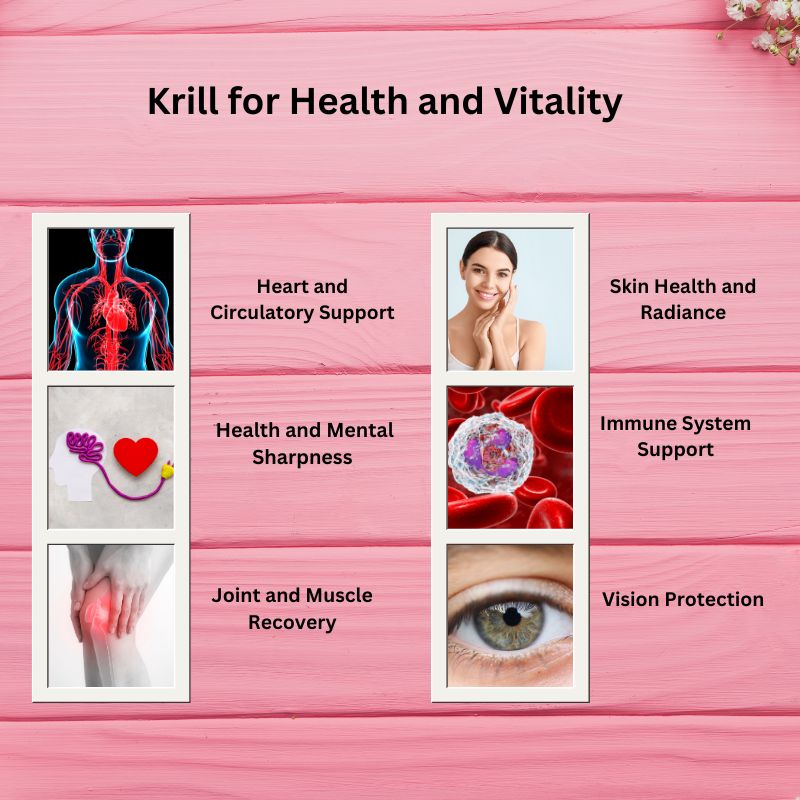
Heart and Circulatory Support
Krill promotes heart health with a combination of omega-3s (EPA and DHA) and astaxanthin. These nutrients help balance cholesterol by reducing LDL and increasing HDL while maintaining healthy triglyceride levels. Omega-3s also enhance vascular flexibility, ensuring smooth blood flow and reducing stress on the heart. Additionally, astaxanthin protects arterial walls from oxidative damage, promoting long-term cardiovascular wellness.
Cognitive Health and Mental Sharpness
Krill delivers unparalleled support for brain health, keeping you mentally agile and focused. The phospholipid-bound omega-3s improve memory and learning by supporting neurotransmitter activity and maintaining neural connections. Astaxanthin provides additional protection by reducing oxidative damage, lowering the risk of age-related cognitive decline and neurodegenerative diseases like Alzheimer’s. Together, these nutrients sustain mental clarity and resilience.
Joint and Muscle Recovery
For those with joint discomfort or active lifestyles, krill is a natural choice. Omega-3s help regulate inflammatory responses in joints, reducing stiffness and pain. These nutrients also play a role in protecting cartilage from wear and tear, supporting long-term mobility. Meanwhile, krill’s protein and omega-3 synergy aid in muscle repair and energy production, making it ideal for athletes and active individuals looking to recover faster and perform better.
Skin Health and Radiance
Krill’s unique combination of omega-3s and astaxanthin helps combat the signs of skin aging caused by environmental stressors. Omega-3s fortify the skin’s natural barrier, preventing dryness and boosting hydration. Astaxanthin reduces the impact of oxidative stress from UV exposure, minimizing wrinkles and promoting elasticity. These nutrients work together to enhance the skin’s resilience and maintain a youthful glow.
Immune System Support
Krill’s nutrients strengthen the immune system, addressing both prevention and recovery. Astaxanthin neutralizes oxidative stress, a common factor that weakens immunity during illness or stress. Omega-3s regulate immune responses, ensuring a balanced defense that avoids overactivity or chronic inflammation. This nutrient synergy supports long-term immune health and helps the body recover faster from infections.
Vision Protection
As vision challenges increase with age, krill delivers essential nutrients for eye health. DHA, a major structural component of the retina, helps maintain visual sharpness and reduces the risk of age-related macular degeneration (AMD). Astaxanthin further supports eye health by shielding sensitive tissues from oxidative damage caused by aging and prolonged screen exposure. Together, these nutrients ensure lasting eye resilience and clarity.
By delving into these areas of health, krill emerges as more than just a nutrient source it’s a natural powerhouse that offers targeted benefits across the entire body.
How Krill Compares to Other Superfoods
When it comes to superfoods, krill stands out as a nutrient powerhouse that outshines many marine and plant-based alternatives. From superior omega-3 absorption to its unique antioxidant astaxanthin, krill offers unparalleled benefits that make it a top choice for health-conscious individuals.
| Factor | Krill Oil | Fish Oil |
| Omega-3 Absorption | More easily absorbed (phospholipid-bound) | Less bioavailable (triglyceride form) |
| Antioxidant Content | Contains astaxanthin for added protection | Lacks astaxanthin |
| Purity & Toxins | Harvested from clean Antarctic waters, lower toxin exposure | May contain more toxins due to pollution exposure |
| Sustainability | More sustainably harvested | Some fish species are overfished |
| Factor | Krill | Algae-Based Omega-3 |
| Omega-3 Content | Contains EPA & DHA with high bioavailability | May contain either EPA or DHA, not both |
| Additional Nutrients | Includes protein and astaxanthin | Lacks protein and astaxanthin |
| Absorption Efficiency | More bioavailable due to phospholipid structure | Less bioavailable |
| Factor | Krill | Plant-Based Superfoods (Chia, Flax, Walnuts) |
| Omega-3 Type | Provides direct EPA & DHA | Contains ALA, which must be converted inefficiently |
| Protein Quality | Complete protein with essential amino acids | Incomplete protein profile |
| Antioxidant Strength | Rich in astaxanthin for superior protection | Contains general antioxidants but lacks astaxanthin |
How Krill Outshines Marine Alternatives
Krill vs. Fish Oil
Fish oil has long been the preferred option for marine omega-3 sources. When compared to fish oil’s triglycerides, the omega-3s in krill are much more easily absorbed because they are bound to phospholipids. With the added benefit of astaxanthin, a potent antioxidant that is absent in fish oil, krill oil provides maximum protection for your cells. Plus, krill is sustainably harvested from the clean, pristine waters of Antarctica, ensuring it contains fewer toxins compared to many fish species exposed to pollution.
Krill vs. Algae
Algae is often touted as a vegan-friendly source of omega-3s, but it falls short compared to krill in several ways. While algae can provide EPA or DHA, it doesn’t offer the nutrient synergy found in krill, such as protein or astaxanthin. Krill’s omega-3s are also more bioavailable due to their phospholipid structure, ensuring you get the maximum benefit from each serving. Plus, krill’s additional nutrients, like essential amino acids, make it a more well-rounded choice for overall health.
Krill vs. Plant-Based Superfoods
Omega-3 Content
While plant-based options like chia seeds and flaxseeds are rich in ALA (alpha-linolenic acid), your body must convert ALA into EPA and DHA, which is often inefficient. Krill, on the other hand, provides ready-to-use EPA and DHA, ensuring direct and immediate benefits for brain, heart, and joint health.
Protein Quality
Plant-based superfoods like chia seeds and walnuts offer some protein, but krill takes it to the next level with its high-quality, complete protein profile. It contains all the essential amino acids needed for muscle repair and growth, making it a superior choice for active individuals.
Antioxidant Properties
While plant-based superfoods are known for their antioxidants, they can’t match krill’s astaxanthin. This unique antioxidant provides enhanced cellular protection against oxidative stress, making krill a standout option for overall health and longevity.
Ways to Add Krill to Your Diet
Adding krill to your diet is easier than you might think, offering both versatility and convenience. Whether you prefer cooking with whole krill meat or taking krill oil supplements, there’s a way to enjoy its powerful benefits that fit seamlessly into your lifestyle.
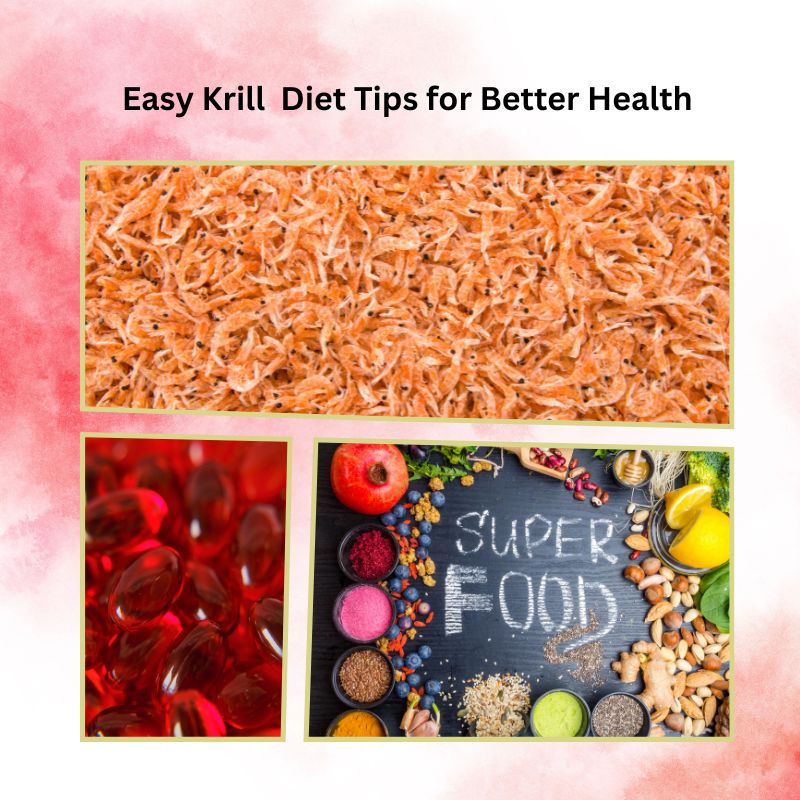
Whole Krill Meat
Whole krill meat is a versatile and nutritious addition to your meals. Its mildly sweet, seafood-like flavor makes it a perfect ingredient for soups and stews, where it can enhance both flavor and nutrition. You can also use krill meat as a protein-packed topping for salads, blending it with fresh greens and a light vinaigrette for a balanced meal. For a quick snack, lightly season and sauté krill meat for a savory treat rich in omega-3s and high-quality protein.
Krill Oil Supplements
For those with a busy lifestyle, krill oil capsules provide an easy way to incorporate the health benefits of krill into your diet. These supplements are portable, convenient, and deliver a concentrated dose of omega-3s, astaxanthin, and essential nutrients. Just a daily capsule can support heart health, reduce inflammation, and provide the antioxidant boost your body needs all without the hassle of meal prep.
Combining Krill with Other Superfoods
Take your nutrition to the next level by pairing krill with other superfoods. For instance, you can mix krill meat into quinoa bowls with roasted vegetables for a meal loaded with protein, omega-3s, and fiber. Pairing krill with leafy greens like kale or spinach can create nutrient-dense salads that support overall health. For a breakfast boost, consider a smoothie bowl topped with berries for antioxidants and a serving of krill oil for added omega-3s. These combinations make it easy to enjoy the benefits of krill while crafting well-rounded, health-focused meals.
Why Krill Deserves Its Place in the Superfood Hall of Fame
Krill is not just another addition to the superfood list it’s a game-changer. While many superfoods excel in one or two nutrients, krill combines an unparalleled blend of omega-3 fatty acids, high-quality protein, and the unique antioxidant astaxanthin. This nutrient synergy sets it apart from the crowd, offering a holistic approach to health that few others can match.
What makes krill particularly deserving of its superfood status is its versatility and accessibility. As both a supplement and a whole food option, krill fits seamlessly into various lifestyles, providing a nutrient boost that is easy to incorporate. Beyond its nutritional profile, krill is a testament to sustainable sourcing practices, ensuring a balance between personal health and environmental responsibility.
Unlike many superfoods that come and go with trends, krill has staying power, supported by research and its adaptability in modern diets. Its unique combination of health benefits, sustainability, and ease of use makes it a true standout, earning its place in the superfood hall of fame.
FAQ
Why Is Krill Oil So Expensive?
Krill oil is more expensive due to its sustainable harvesting practices, advanced extraction methods, and high nutrient content, including bioavailable omega-3s and astaxanthin. Additionally, krill is harvested in remote Antarctic waters, which adds to production costs. Its superior absorption and unique benefits often justify the price.
Does Krill Increase Cholesterol?
Krill oil is generally associated with improving cholesterol levels rather than increasing them. It helps reduce LDL (bad cholesterol) and increase HDL (good cholesterol) thanks to its omega-3 fatty acids. However, individual responses may vary, so consult a healthcare provider for personalized advice.
What Is the Nutritional Value of Krill?
Krill is rich in high-quality protein, omega-3 fatty acids (EPA and DHA), phospholipids, and astaxanthin, a powerful antioxidant. It also contains essential vitamins and minerals like vitamin A and selenium, making it a nutrient-dense food that supports heart, brain, and joint health.
Is Krill Stronger Than Fish Oil?
Krill oil is often considered stronger than fish oil due to its superior absorption. The omega-3s in krill oil are bound to phospholipids, which enhance bioavailability. Additionally, krill oil contains astaxanthin, providing extra antioxidant and anti-inflammatory benefits that fish oil lacks.
Are There Negative Side Effects of Krill Oil?
Krill oil is well-tolerated by most people, but some may experience mild side effects such as stomach upset, bloating, or fishy aftertaste. Rarely, it may interact with blood-thinning medications due to its omega-3 content. Always consult a doctor before starting supplements.

